System Storage Benchmarks
For our SSD comparison today, we are including the TEAMGROUP T-FORCE CARDEA A440 Pro 2TB PCIe Gen4 M.2 NVMe SSD to see how the Pro and Lite compare in performance. All of our data was procured fresh at the time of review on both SSDs. We are also including several other PCIe Gen4 competitive SSDs, to see where they all line up, all SSDs were tested on the same system.
3DMark
We are using 3DMark’s Storage Benchmark which tests common gaming workload traces. The benchmark tests loading Battlefield V, Call of Duty Black Ops 4, and Overwatch. It tests moving games by copying a Steam folder for CS:GO, and installing Outer Worlds from the Epic Games Launcher, and saving game progress in The Outer Worlds. It tests recording a 1080p gameplay video at 60FPS with OBS while playing Overwatch. We will graph the Overall Benchmark Score, higher is better.
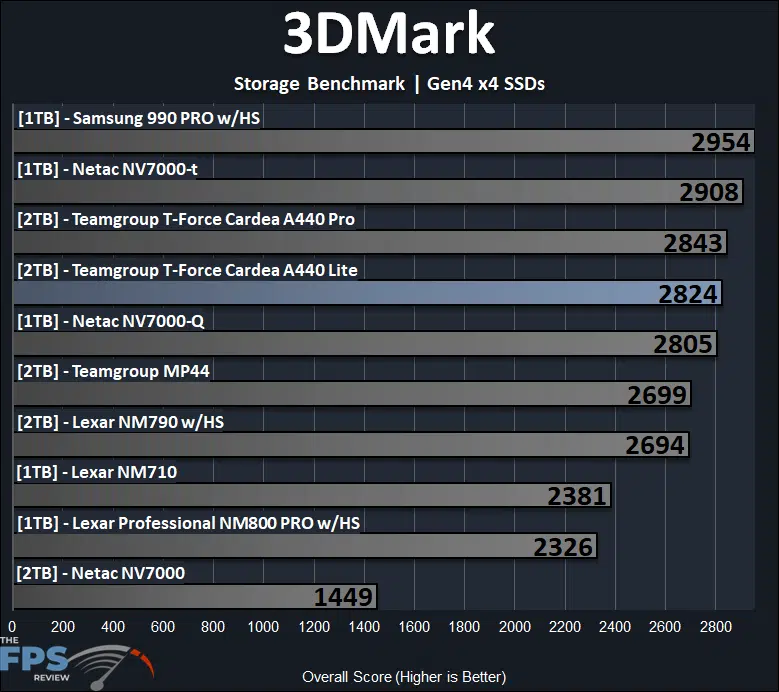
In our review, in the 3DMark Storage Benchmark, the TEAMGROUP T-FORCE CARDEA A440 Lite 2TB SSD scored a total of 2,824 points in 3DMark. This puts it under less than a 1% difference with the A440 Pro, meaning it performs similarly in this game-focused storage benchmark. At this performance level the TEAMGROUP T-FORCE CARDEA A440 Lite 2TB SSD is performing above the Teamgroup MP44 in performance, 5% faster, and also much faster than the Lexar NM710 and Netac NV7000 in this benchmark.
PCMark 10
We are using PCMark 10’s Full System Drive Storage Benchmark. It outputs an overall score (higher is better) that is derived from the Bandwidth (higher is better) as well as access time (lower is better) results.
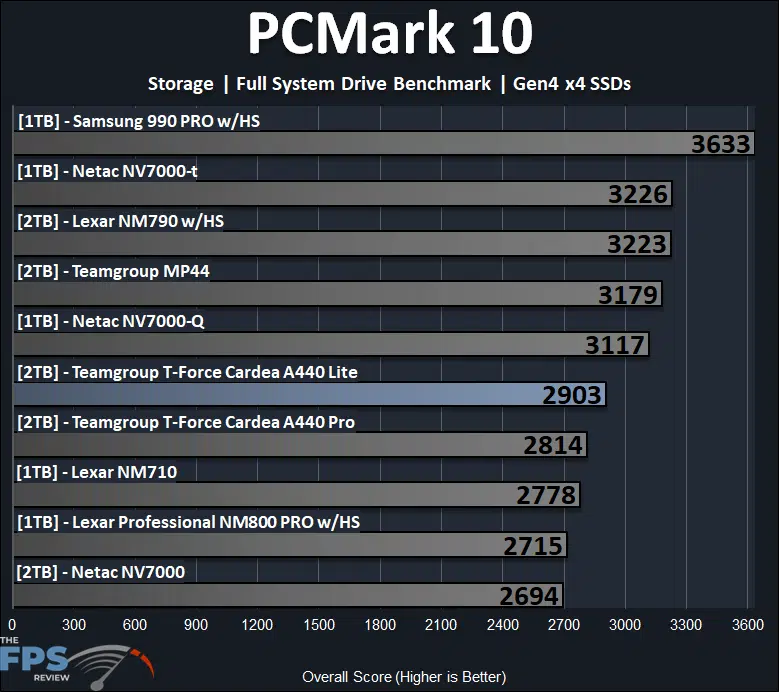
In PCMark 10’s full system drive storage benchmark, the TEAMGROUP T-FORCE CARDEA A440 Lite 2TB SSD scores 2903, which actually ends up being 3% above the A440 Pro, and this is related to the access time which you will see below. At 2903 the TEAMGROUP T-FORCE CARDEA A440 Lite 2TB SSD is about 10% behind the Teamgroup MP44, and nothing beats the Samsung 990 Pro here, but it is also much more expensive. The TEAMGROUP T-FORCE CARDEA A440 Lite 2TB SSD is faster than the Lexar NM710, NM800, and Netac NV7000 by a much larger amount, 8%.
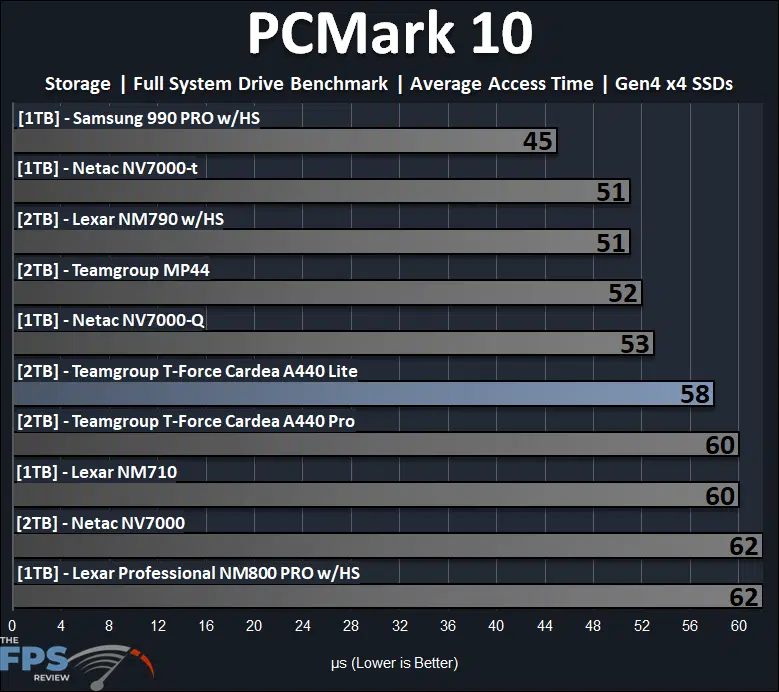
The average access time test in PCMark 10’s Storage Benchmark shows you a closer look at where things line up. The TEAMGROUP T-FORCE CARDEA A440 Lite 2TB SSD sits at 58 microseconds, and this is just a smidge faster than the A440 Pro, and this is why the PCMark 10 full drive storage test is also a smidge faster on it, the access time is slightly tighter. At 58 microseconds it is a bit slower on access than the Teamgroup MP44, which is another SSD that is DRAM-less, but there are some slower drives with the Netac NV7000 and Lexar NM800 Pro, so it’s about right in the middle.
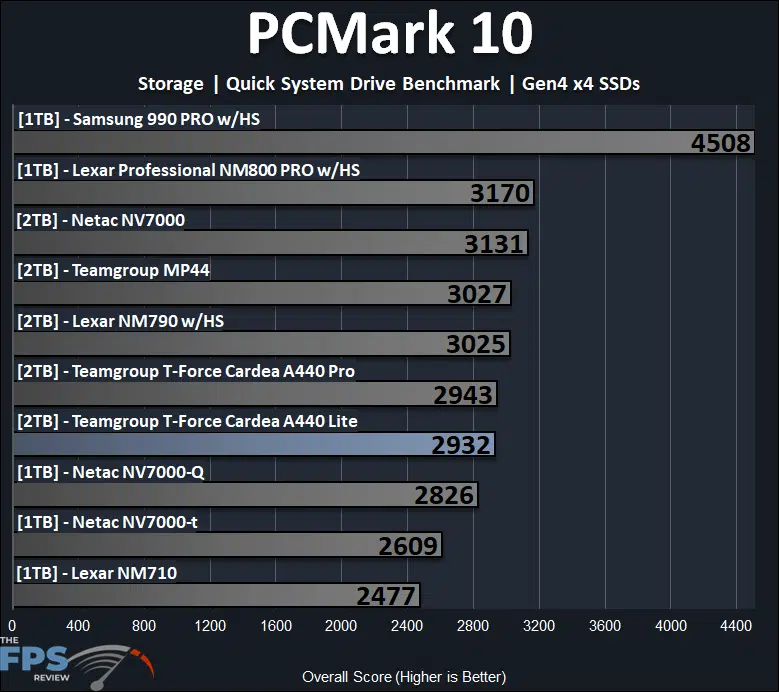
PCMark 10’s quick system drive storage benchmark focuses on smaller workloads, and typically this is where we see the benefit of a DRAM cache. Therefore, it is not surprising that the TEAMGROUP T-FORCE CARDEA A440 Lite 2TB SSD falls just a bit behind in this benchmark, compared to other SSDs with a DRAM cache. However, it is still keeping pace with the A440 Pro, which is interesting, and it is faster than the Netac NV7000-t and Lexar NM710, that one by a lot. I would say the A440 Pro is probably underperforming in this benchmark, as the Teamgroup MP44, also without a DRAM cache, performs faster overall, so the TEAMGROUP T-FORCE CARDEA A440 Lite 2TB SSD is about 3% behind the Teamgroup MP44.
PassMark PerformanceTEST
We are using PassMark’s PerformanceTEST Disk Mark benchmark only. This test benchmarks Disk Sequential Read, Disk Sequential Write, IOPS 32KQD20, IOPS 4KQD1 tests and outputs an overall score (higher is better.)
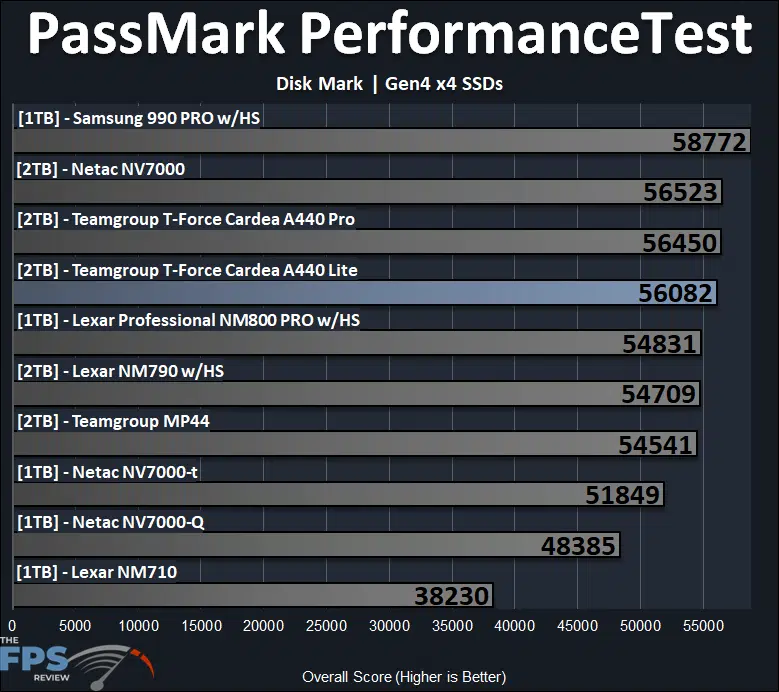
In PassMark PerformanceTest Disk Mark this benchmark takes everything into consideration, small workloads, large workloads, access time, and DRAM cache, and here the TEAMGROUP T-FORCE CARDEA A440 Lite 2TB SSD is performing very well. It is only slightly behind the A440 Pro at under 1%, so they are on par on performance really. This puts the TEAMGROUP T-FORCE CARDEA A440 Lite 2TB SSD near the top of the graph, being faster than the Teamgroup MP44 by 3% and faster than the Netac NV7000-t and Lexar NM710 by a lot.
